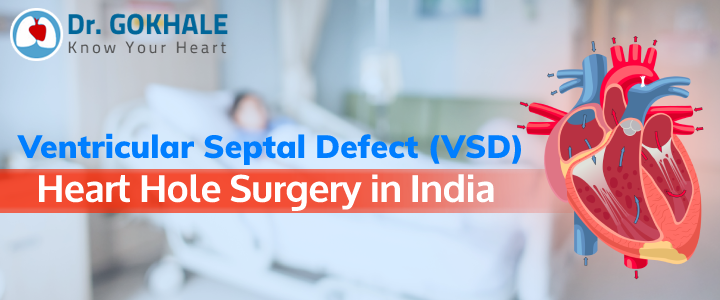A small hole in the heart usually heals and closes on its own, the complications ensue when the hole is larger and fail to heal. In this blog, we help you understand the ventricular septal defect, its causes, symptoms, complications, treatment and then guide you to the best heart surgeon in India for consultation. Read on:
Ventricular Septal Defect – Complications:
The wall between the lower chambers of the heart i.e. ventricular septum is made up of different tissues. While some part is made up of muscular tissue, rest is composed of fibrous tissue and the symptoms, depending on the location of this hole.
The majority of the holes, particularly present in the muscular part of the septum wall close by themselves and usually do not cause any health problems. These small defects may rarely cause other heart issues which is why the patient must continue seeing a heart specialist once in a while to stay ahead of any problems and developments. That said, large ventricular septal defects can cause serious problems to the child.
For babies born with this defect, the pressure in the lungs and right side of the heart decreases after the first few weeks post-pregnancy and as a result, blood starts to flow towards the right side, over time leading to symptoms of congestive heart failure.
Medium ventricular septal defects are even more unpredictable. They may close on their own or end up the same as large defects resulting in congestive heart failure, according to leading heart surgeon in Telangana, Dr Alla Gopala Krishna Gokhale.
Symptoms & Causes of Ventricular Septal Defect:
By now you must have understood that the symptoms of this defect depend on the size of the defect and its development. In general, patient with the ventricular septal defect may experience rapid breathing, pale skin colouration, and frequent infections of the respiratory system, fatigue, weakness and difficulty in breathing.
Being a congenital heart defect, VSD occurs in the early stage of heart development for reasons that are not identified singularly. Genetic syndromes (extra missing pieces of chromosomes) and environmental factors are considered to play a role in the development of this defect. It is also possible for a patient to develop the defect later in life due to a heart attack or any other failed heart procedures.
Treatment for Ventricular Septal Defect in Hyderabad:
Depending on the symptoms that manifest due to the defect, the treatment is planned by a heart specialist. In most cases, these defects close by themselves which is why heart specialists do not recommend heart-hole surgery as soon as the defect is identified. Instead, they try to treat the symptoms of congestive heart failure to wait to see if the hole heals and closes. In cases where the defects are hard to control and continue to cause health problems to the child, heart-hole surgery is often recommended where the hole is surgically repaired by a heart surgeon.
Heart-hole surgery in India is an advanced procedure that requires an experienced heart surgeon with a remarkable track record in performing paediatric heart surgeries. If you are living in Hyderabad then you are fortunate because the leading heart surgeon in India, Dr Alla Gopala Krishna Gokhale is available for consultation, right in your city. You can contact him here: 9603040506
 Ask Doctor
Ask Doctor
